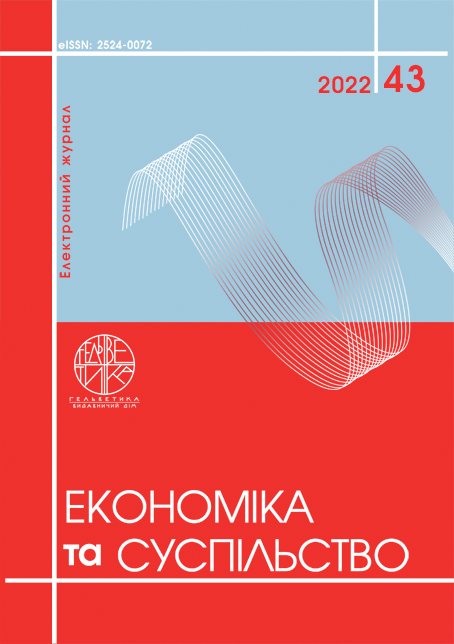KNOWLEDGE MANAGEMENT: INTEGRATION OF KNOWLEDGE EXCHANGE BETWEEN EMPLOYEES IN THE COMPANY'S CORPORATE CULTURE
Abstract
The purpose of this article is to investigate the process of knowledge management in the organization and to show its connection with corporate culture. In conditions of constant variability and uncertainty, when innovation processes play a significant role in the development of the organization, the issue of creation and exchange of knowledge between employees is extremely relevant. The very technology of the knowledge exchange process has not yet been defined both at the theoretical and practical level. The concept of knowledge management cannot be considered separately from the company's corporate culture, since it is precisely this that promotes the effective exchange of knowledge between employees. Therefore, an important part of the research is the disclosure of the issue of integration of knowledge exchange between employees into the corporate culture. General scientific and special methods are used for research, namely: the method of system-structural analysis for the systematization of concepts, methods of theoretical generalization, analysis and synthesis, the method of logical generalization - for formulating conclusions, and other research methods. scientific knowledge. The role of the knowledge management process in the company in relation to its strategy and main goals is considered. The concept of corporate culture and its main criteria affecting the formation of the knowledge exchange process between employees are revealed. The historical retrospective of the production of new knowledge and its management is considered. The knowledge management process is analyzed as a system of 4 interconnected components. The main units of knowledge exchange are considered and their definitions are given. The conditions for the implementation of the knowledge management system in the organization have been determined. The process of knowledge exchange in the company is analyzed as a component of the knowledge management system. The main units of knowledge exchange are considered: data, information and knowledge, as well as the difference between these concepts, which makes it possible to understand the correct use of these terms in the article. The essence of codified and informal knowledge was analyzed and the difference between these concepts was determined. The main problems on the way to the formation of the knowledge management process and ways to solve them have been identified.
References
Drucker P. F. The new Productivity Challenge // Harvard Business Review. 1991. November-December. P. 69.
Покрамович О. В. Технологии корпоративного обучения: новые способы, перспективы развития. Теория и практика сервиса: экономика, социальная сфера, технологии. 2018. № 2 (36). С. 28–30.
Garcia-Perez A., & Ayres, R. (2010). Wikifailure: The limitations of technology for knowledge sharing. Electronic Journal of Knowledge Management, Volume 8, Issue 1, pp. 43–52.
Olena Oliinyk (2021). Conceptual framework of implementing knowledge management system in business organizations. Social and labour relations: theory and practice, 11(2), 1–9. DOI: https://doi.org/10.21511/slrtp.11(2).2021.01
Weinberg, F. J. (2015), "Epistemological beliefs and knowledge sharing in work teams: A new model and research questions", The Learning Organization, Vol. 22 No. 1, pp. 40–57. DOI: https://doi.org/10.1108/TLO-11-2013-0067
Варавва М. Ю. Информация, знания, научные знания как базовые категории новой экономики. Теоретическая экономика. 2018. № 2 (44). С. 120–127.
Zebal, M., Ferdous, A. & Chambers, C. (2019). An integrated model of marketing knowledge – a tacit knowledge perspective. Journal of research in marketing and entrepreneurship, vol. 21, no. 1, pp. 2–18. DOI: https://doi.org/10.1108/JRME-03-2018-0018
Палицын В. К вопросу о соотношении понятий «знания», «информация», «данные». Наука и инновации. 2018. № 2 (180). С. 44–49.
Drucker P. F. The new Productivity Challenge // Harvard Business Review. 1991 November-December. P. 69.
Pokramovich O. (2018). Tekhnologii korporativnogo obucheniya: novye sposoby, perspektivy razvitiya [Technologies of corporate training: new ways, prospects]. Teoriya i praktika servisa: ehkonomika, sotsial'naya sfera, tekhnologii – Theory and practice of service: economics, social sphere, technologies, vol. 2 (36), pp. 28–30. (in Russian)
Garcia-Perez A., Ayres, R. (2015). Wikifailure: The limitations of technology for knowledge sharing. Leading Issues in Knowledge Management, Volume Two, 2, 242.
Olena Oliinyk (2021) Conceptual framework of implementing knowledge management system in business organizations. Social and labour relations: theory and practice, 11(2), 1–9. DOI: https://doi.org/10.21511/slrtp.11(2).2021.01
Weinberg, F. J. (2015), "Epistemological beliefs and knowledge sharing in work teams: A new model and research questions", The Learning Organization, Vol. 22 No. 1, pp. 40–57. DOI: https://doi.org/10.1108/TLO-11-2013-0067
Varavva M. (2018). Informatsiya, znaniya, nauchnye znaniya kak bazovye kategorii novoj ehkonomiki [Information, knowledge, scientific knowledge as basic categories of the new economy]. Teoreticheskaya ehkonomika – Theoretical Economics, 2 (44), 120–127. (in Russian)
Zebal, M., Ferdous, A. & Chambers, C. (2019). An integrated model of marketing knowledge – a tacit knowledge perspective. Journal of research in marketing and entrepreneurship, vol. 21, no. 1, pp. 2–18. DOI: https://doi.org/10.1108/JRME-03-2018-0018
Palitsyn V. (2018). K voprosu o sootnoshenii ponyatij «znaniya», «informatsiya», «dannye» [On the question of the relationship between the concepts of "knowledge", "information", "data"]. Nauka i innovatsii – Science and Innovation, vol. 2 (180), pp. 44–49. (in Russian)


